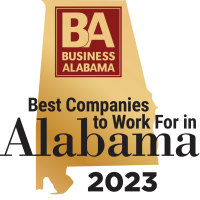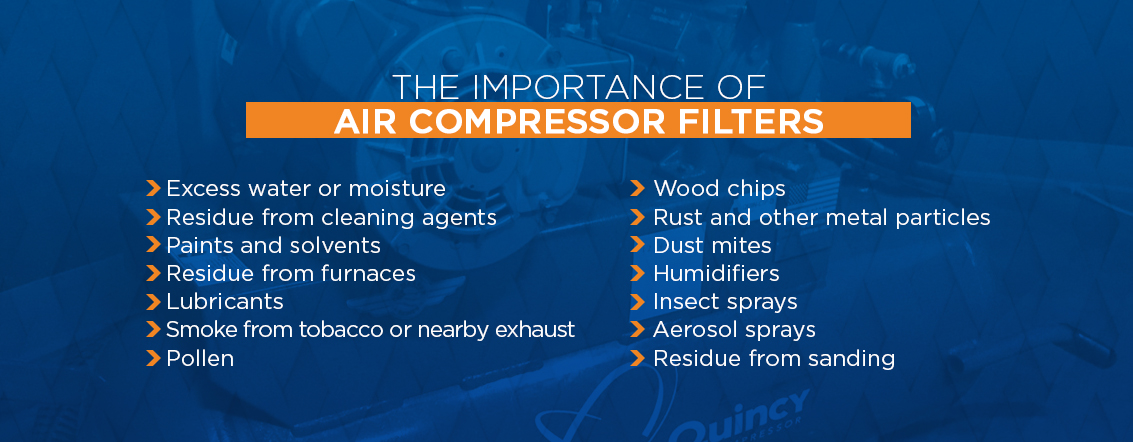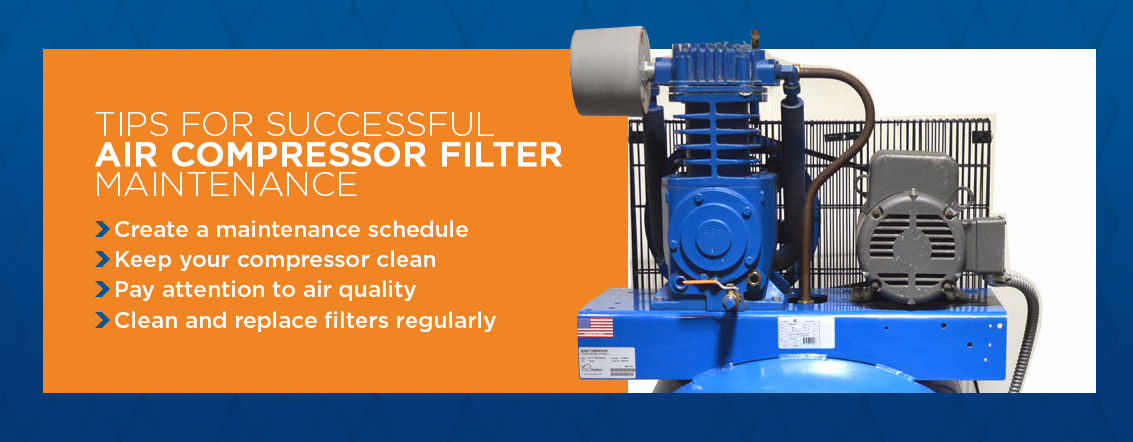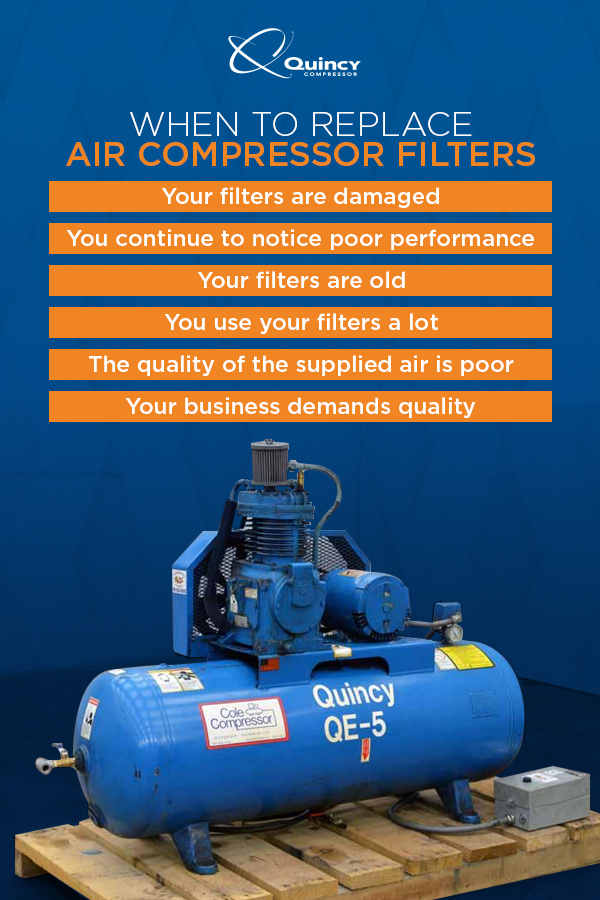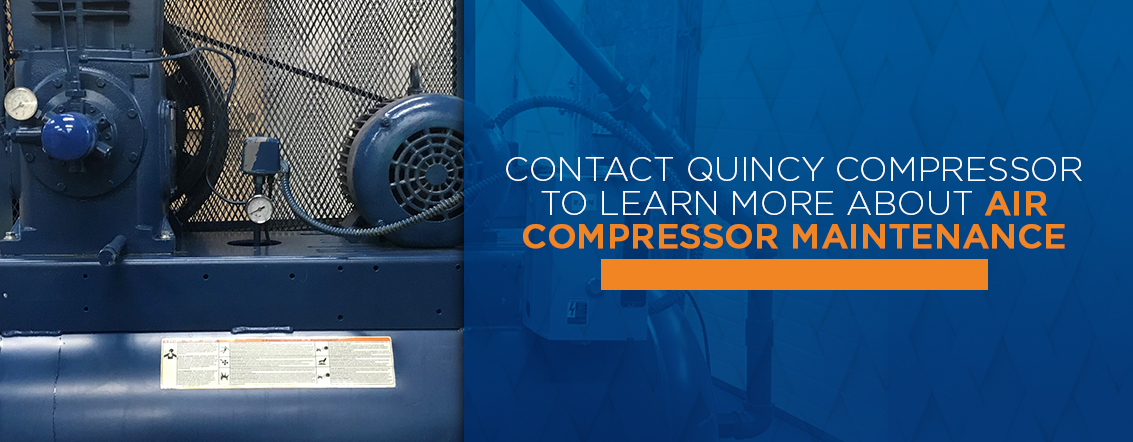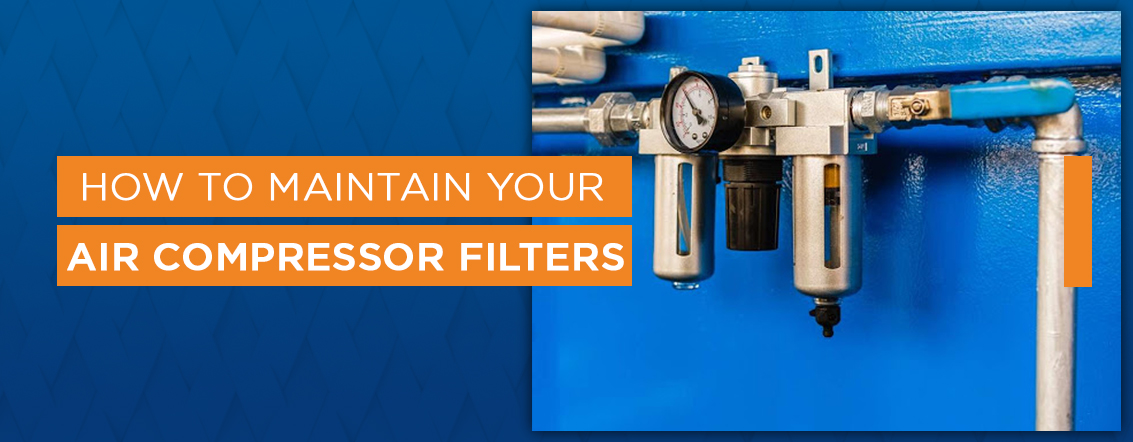
Both indoor and outdoor air is full of everyday pollutants that absorb into your compressed air. To ensure the safety of your compressor machine and a high-quality end product, make sure your compressor is equipped with an air filtration system that can capture and dispose of these contaminants.
Learning how to maintain these air compressor filters is the best way to keep your compressor operating efficiently. Effective maintenance includes knowing how to clean your filters, as well as knowing when it is time for a filter replacement.
How a Compressed Air Filter Works
There are three types of in-line compressed air filters:
- Particulate: Particulate or dry particulate filters work to trap and contain corrosive or solid particles from the air during the filtration process.
- Coalescer: Coalescing filters remove water, aerosols and oils from compressed air, but are typically unable to remove gaseous vapors.
- Absorber: Adosoprtion helps eliminate gaseous vapors by chemically bonding those vapors with the surface of the absorber.
The strength of an in-line air filter is measured in “microns,” which are microscopic particles in the air. Air filters for air compressors can also be standard or high-pressure. Many manufacturers, including Quincy Compressor, also provide advanced filtration equipment, like mist eliminators. A mist eliminator is a heavy-duty, standalone coalescing air filter.
An air compressor filter will only perform its job well if all parts are sized correctly, and the mechanism is installed properly. Otherwise, you waste time and energy and risk restricting airflow. The following components make up an air compressor filtration system:
- Filter cap: The filter cap protects the filter and helps direct the flow of air during the filtration process.
- Filter discharge: The filter discharge area is the spot on the filter where purified compressed air exits.
- Filter element: The filter element is the part of the filter that works to trap or eliminate particles, oils and moisture. The filter element needs to be cleaned and changed regularly.
- Filter bowl and bowl guard: The bowl and bowl guard connect the filter cap to the rest of the filtering mechanism and houses the “quiet zone,” which is the area that collects dirt, oil, water and other debris at the bottom of the filter. This keeps the contaminants from re-polluting the compressed air.
- Filter drain: Filters have a drain that is usually controlled either manually or automatically. It expels all collected water, oil and dirt from the filtering mechanism. Regular draining is essential for proper filtering and a long-lasting air compressor.
The Importance of Air Compressor Filters
Clean, functional filters are essential for the performance and longevity of your air compressor. No matter how clean a manufacturing facility or workshop is, there are still undetectable particles and residue in the air that can pollute and clog your airflow. Over time, these pollutants can build-up and cause your compressor to stop working. They can also contaminate your end product.
Some examples of common air pollutants that air compressor filters help trap and eliminate are:
- Excess water or moisture
- Residue from cleaning agents
- Paints and solvents
- Residue from furnaces
- Lubricants
- Smoke from tobacco or nearby exhaust
- Pollen
- Wood chips
- Rust and other metal particles
- Dust mites
- Humidifiers
- Insect sprays
- Aerosol sprays
- Residue from sanding
Filters work to isolate these contaminated particles from clean ones, and then trap or eliminate the pollutants. This leaves you with pure, clean compressed air.
Air Filters Lead to Better Results
When you operate your machine with old or dirty air compressor filters, you risk tainting the compressed air with contaminants like pollen, dirt, rust and other build-up. Air compressors operating with clean filters put out better quality air. The higher the air purity, the safer it is for you, your employees and the surrounding environment.
Higher quality air also means a higher quality end product. For certain facilities, such as laboratories and food processing plants, air purity and the quality of your final product is crucial. By using and maintaining air filters, you are ensuring adequate, clean and effective airflow while minimizing the chances that you will have to make costly corrections or do-overs.
Filters Protect Your Compressor
Moisture and debris build-up and generally poor air can put a lot of strain on your compressor. In such conditions, the machine has to work twice as hard to compress air. This overworking can lead to premature aging of your compressor, as well as increased energy costs. Filters protect your compressor and reduce unnecessary strain on its inner mechanisms. Using and maintaining air filters is the best way to produce compressed air quickly while using minimal energy consumption.
Tips for Successful Air Compressor Filter Maintenance
It is not enough to simply install an air filtration system in your compressor and walk away. To avoid worsening any existing problems or overworking your machine, regular filter maintenance is crucial. Follow these tips to get the most out of your air filtration system:
- Create a maintenance schedule: Create a regular maintenance and cleaning schedule for your air compressor, including frequent air filter quality checks and replacement. In addition to regular self-inspections, schedule annual preventive maintenance appointments for your air compressor and ask the service technician to inspect your filtration system.
- Keep your compressor clean: External dirt, rust and build-up can damage your machine. A clean air compressor is less likely to pollute airflow, and it looks more professional. At the end of each use, turn off your air compressor and allow it to cool before wiping it down with a microfiber cloth or gentle cleaning agent.
- Pay attention to air quality: Whenever possible, operate your air compressor in an open-air workplace rather than in a workshop or near things like other machinery, paint guns, smoke, aerosol or other pollutants. Eliminate all unnecessary indoor pollutants, including tobacco smoke. If operating your air compressor indoors, make sure the space is adequately ventilated.
- Clean and replace filters regularly: The most important thing you can do to take care of your air compressor and your air filtration system is to inspect, clean and replace your air filters regularly.
How Do You Clean an Air Compressor Filter?
Always check your air compressor or filter owner manual or instruction guide for specific instructions regarding the proper way to clean your air filters.
If no instructions are listed — or no manual is available — these are the general steps you can take to clean your air compressor filter:
- Turn the air compressor off and let it cool before handling it.
- Unscrew and remove the filter top cover from the filter base.
- Perform a visual inspection of the top cover and note any areas of concern.
- Carefully remove the filter element from the base.
- Inspect the filter element.
- Blow any dust, dirt or debris away from the filter element with low-pressure compressed air.
- If a replacement is not necessary, gently secure the element to its original place.
- Reattach the top cover.
Perform this inspection regularly — every month is ideal, but at least once per season — and replace filters when necessary.
When to Replace Air Compressor Filters
Unless your air compressor or filter manufacturer states otherwise, there is no set frequency in which you should change your air filters. Generally, you should replace your air compressor filters when:
- Your filters are damaged: When cleaning your filters, you should note any damage, corrosion or caked-on build-up. If you continue to use a broken air compressor filter, you risk poor air quality, damaging your air compressor and operating under higher energy costs. Replace damaged filters as soon as possible.
- You continue to notice poor performance: If you have cleaned your air filters but continue to experience poor performance or air quality, it is probably time to replace the filters. If replacing the old filter with a new one doesn’t work, consult an air compressor service technician. It is possible you have installed the incorrect filter, or that there is a larger problem at play.
- Your filters are old: If it has been a while since you last replaced your compressor air filters, it is probably time to replace them. The best way to keep track is to create — and stick to — a maintenance schedule and replace your filters at regular intervals. The best way to avoid a clogged air compressor filter or internal build-up is to change your filters before it becomes an issue.
- You use your filters a lot: If you use your air compressor regularly and for long periods, you will need to replace filters more frequently than a compressor you only use as needed.
- The quality of the supplied air is poor: If you work in an environment that has a lot of dirt, paint, pollen or other debris present, your filters will likely require more frequent cleaning and replacement. Be aware of your surrounding air quality. To minimize the frequency of cleaning and replacements, make changes around your workplace to promote better air.
- Your business demands quality: If the quality of your work or your business’ reputation depends on the performance of your air compressor and the purity of your compressed air — such as in food and pharmaceutical production and processing — regular filter replacement is essential to avoid work delays or costly malfunctions.
What to Consider When Choosing an Air Compressor Filter
If it is time to replace the filter in your air compressor, it is vital you choose the right one. Here’s what you should consider when choosing your next air compressor filter:
- Your specific compressor: Note the type of air compressor you are operating, including the type, brand, model number, date of manufacturing and size. Many filters can only be used with specific types or models of air compressors.
- Type of air filter: Take into consideration the type of air filter you have been using. Is it a particulate, coalescer or absorber? Is it a standard air filter or one intended for high-pressure use? What size is it? If you have no issues with your current compressor operation, it is a good idea to stick with the same type of filter. However, if you have performance concerns, a different kind of filter may be what you need to address them. Consult a compressor service technician for a filter recommendation.
- Brand and quality: Always choose a reputable air compressor or compressor filter brand that produces high-quality products, especially if you are operating in a commercial or industrial environment, or if you use your compressor daily. Poor quality air filters can be counterproductive and lead to wasted energy and money. They can also cause production delays if they do not work correctly.
- Quality of used air: Examine the quality of the air you are operating your compressor in. Are your primary pollutants water-based? Solid dirt particles? Lubricant oil? Some applications require filters that specifically address these pollutants, like water separators or carbon filters.
- Your compressed air needs: Next, determine what level of air quality you need your compressor to produce. What level of purity should it be? This will help you determine the type of filtration required, as well as the size and number of filters needed.
If you are still unsure which air filter is best for your compressor, give Quincy Compressor a call at (251) 937-5900. Our experienced air experts will ask you questions about your compressor, your current air quality and air production needs. They will then use this information to help you make the best decision.
Contact Quincy Compressor to Learn More About Air Compressor Maintenance
Quincy Compressor has been providing high quality, industry-standard compressors and compressor products since 1920. Whether you have questions about your compressor filter, are in the market for a new compressed air machine or just want to learn more about the services we provide, you can trust our experts.
We offer a variety of standard and high-pressure air compressor filters, including threaded aluminum filters for flows up to 1,500 CFM and filters with steel housings and flanged connections for flows up to 10,500 CFM. All standard air filters are constructed with a multi-wrap element and are corrosion resistant. They come equipped with an automatic condensate drain, as well as a 10-year housing guarantee.
Our high-pressure air filters provide two levels of filtration, including coalescing and an activated carbon absorber that work together to eliminate liquid aerosol, vapor and odor from processed air. High-pressure filters are also constructed with a multi-wrap element and have a modular design that helps conserve energy while filtering. High-pressure filters are compatible with mineral oil and synthetic lubricant.
To get started, find a service and sales representative in your area or feel free to contact our knowledgeable professionals with any specific questions. You can also visit us online to learn more helpful tips about air compressor maintenance.

